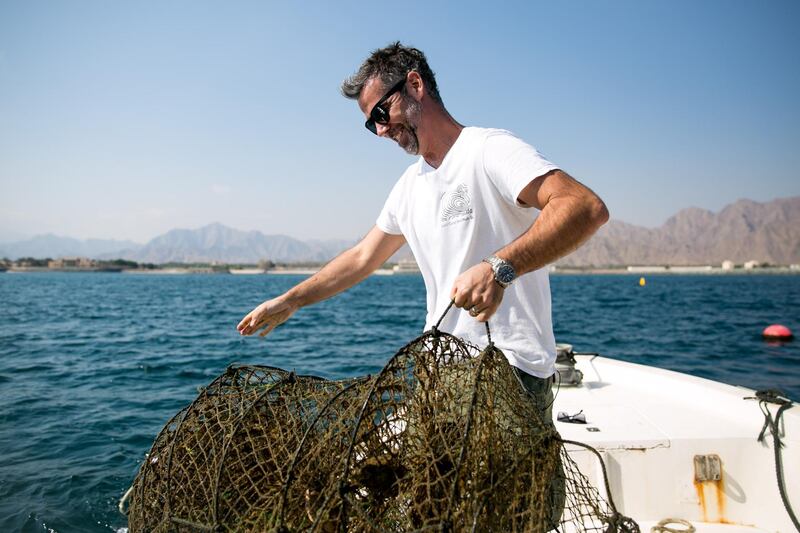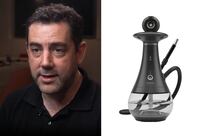When Ramie Murray set out to start a business in the field of aquaculture a few years ago, his plan was to farm rock lobsters.
He also threw a few oyster spats, or baby oysters, into the mix, just to see how they would do.
As it turned out, the hatchery cycle of the rock lobster was too complicated to make a go of it. But the oysters? The oysters grew to be just about perfect.
Flash-forward to September 2017 and Mr Murray soft-launched Dibba Bay, the UAE's first oyster farm, located in Fujairah. Four months later, he's shipping 25,000 to 30,000 oysters to about a dozen restaurants in Dubai each month.
“We’re pretty much on track,” he explains. “There’s not a lot of reliable statistics about how big the oyster market is here. We had an inkling it was a certain size and we knew if we had a good product that the market was there for it, and thankfully it’s proving out.”
Mr Murray took a circuitous route to aquaculture. The "classic British expatriate" moved to Dubai when he was 12 with his dad working in oil and gas and his mother, a teacher. He went back home to Scotland for university, where he studied industrial design, before returning to the UAE to start a computer-generated imagery (CGI) company. Mr Murray later spent some time in Oman, where he had a renewable energy company , and eventually decided to pursue aquaculture after spotting a wide-open local market.
“It’s a massive growth industry and it’s totally unexploited along the UAE, Yemeni, Omani, coast,” he says. “It’s a whole area and one of the key things for aquaculture is having very clean water, and the whole coastline is completely undeveloped.”
Not only is the coast sparsely populated, but there are none of the rivers – and the industries that tend to locate on their banks – dumping a steady stream of pollutants into the oceans, which is the case with other, colder, regions.
Add to that the opportunity created by the growing worldwide movement to eat local, and Mr Murray was sure he was on to something. The fact that oysters grow much faster in the UAE's warm waters, taking seven or eight months to mature versus two years in France, was another plus for the business case.
The results are delicious, meaty and briny, and stack up to any oysters grown in more established countries.
"We've got the added benefit of everyone who know the fresher the seafood, the better… but oysters you generally eat live, so you want them as extra fresh as possible," says Mr Murray. " It's really important that we could be pulling them out of the water here and they can be with consumers a day later."
Although, Mr Murray was confident that he had hit a sure thing, there were many hurdles to overcome before he could launch the farm.
As a new business, he wasn’t able to borrow funds from the bank for startup costs for the first two years. So he raised equity finance from an “enthusiastic group of friends and family and oyster lovers”. With an Emirati partner in place, the next hurdles were bureaucratic, made more complicated by the fact that what he was proposing had never been done before.
The municipality, while helpful, wasn’t sure what kind of license to issue, while the federal authorities had to adjust their register of allowed imported species.
_______________
Read more:
[ Exploring Dibba Bay, the UAE's very own oyster farm ]
[ Restaurant openings: your guide to what's new on the UAE's dining scene ]
_______________
“I encountered a lot of help along the way, from the various foreign entities, but it took time, just organising the ocean lease and agreeing where the area is going to be and organising the area in the port, it was bureaucratically quite challenging,” he says. “Let alone convincing people that it was going to work and that it was a worthy investment.”
Mr Murray imports the oyster spats, as local conditions for breeding the Crassostria gigas, or Pacific cupped oyster, species he uses, aren’t ideal. Most oyster farmers don’t breed their own spats anyway these days, he explains.
The oysters are grown in multi-level, underwater nets with increasing mesh sizes, thriving as they bump against each other about three meters below surface at Dibba Bay’s three hectare farm.
After the oysters are collected, they are flushed, chilled down to market temperatures, and shipped to restaurants through a local seafood distributor.
One of Dibba Bay’s biggest clients is the Yorkshire-turned-Australia celebrity chef Sean Connolly, who was eager to “buy local” and get the oysters into his restaurant at Dubai Opera when it opened around the same time Mr Murray launched operations.
“A friend said I should try Dibba oysters and I tasted them,” says Mr Connolly. “I was really excited about them, and I said to Carl, my chef, ‘have you chased those people up’?”
Mr Murray hopes to be producing 150,000 oysters per month by next season, and has already explored expanding his farm and production facilities to accommodate that pace of growth.
“The government has been very supportive and they are quite happy in increasing the size of the site and maybe having a second site,” he says. “It’s something they very quickly picked up on in helping with food security.”
Mr Murray, who started out with three workers 18 months ago, now has 12 employees. "Finding staff was, and is, challenging as we are the only oyster farm in the region, so we have to train them up," he notes.
Now that the business is fully operational, Mr Murray doesn't look back and says there is no point in second-guessing anything he did – or mistakes he may have made – while pioneering the project.
“There’s no point regretting anything in these scenarios,” he says. “When you are doing something for the first time there is no correct way to do it. You can look back and go, oh well, I maybe should have done it that way, but there’s no way to have known it at that time and all you can do is just go for it. And I would say that to anybody in any sector.”






